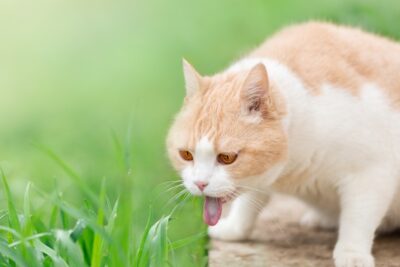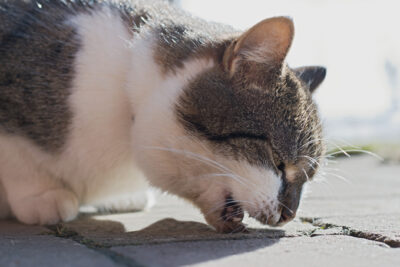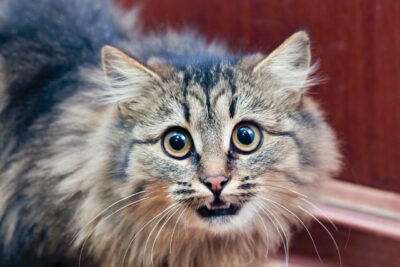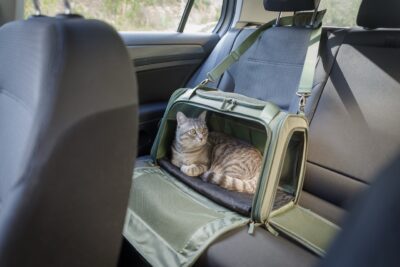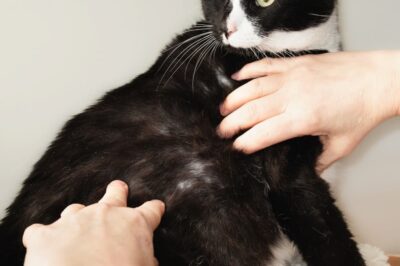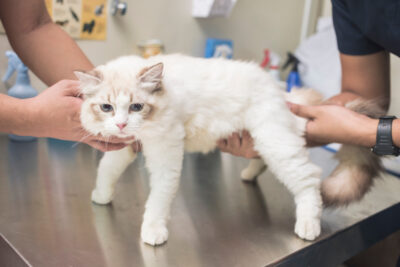Sponsored by CareCredit
Coughing Cat: 11 Common Causes (and How to Help)

Coughing is a normal response to any irritation in your kitty’s airways or throat. Even though it’s a normal response, cats should not cough often or cough regularly. Most pet parents have never even heard of a cat coughing before!
So how do we know if our cat is coughing or if they are doing something else? When should we feel concerned? And what causes cats to cough? Read below to find the 11 most common causes of coughing in cats.
Do Cats Cough?
Cats can cough just like people do. Any irritation in the respiratory tract could lead to a cough. Coughing on rare occasions (once every few months or even less frequently) could be normal, but most cats do not cough unless something is wrong.
A cat’s respiratory system goes from the nose all the way to the lungs. This includes the nasal cavity (chamber of the nose), pharynx (throat), larynx (voice box), trachea (windpipe), and lungs. Inside the lungs are passageways for air called bronchi that get smaller and lead to bronchioles. Cats cough when there is irritation anywhere from the pharynx down to the bronchioles. So knowing exactly why (or from where) the cough is coming from can be tricky.
What Does a Coughing Cat Sound Like?
A cat who coughs usually stops what activity they are doing and sticks out their head, extending their neck. You may hear one cough, or several. If your cat coughs several times in a row, they will stand or sit in one place during this.
There are two types of cat coughs: a dry cough or a productive (wet) cough. Some causes of coughing will increase mucus production and produce a wet cough, while others will not and produce a dry cough.
A dry cough sounds like a “honk” or “wheeze” and your cat does not swallow afterward.
A wet cough sounds like water or something caught in the back of your cat’s throat—perhaps like crackles. They will swallow afterward.
Other Reasons for Cat Coughing Sounds
It is very challenging for pet parents to know if their cat is actually coughing or producing a different sound. Some other things that could be happening instead of coughing include:
Retching occurs when something catches in the back of the throat. Cats will usually make a sudden loud noise with their mouths wide open briefly before shutting it again. Retching can occur after a fit of coughing. A very small amount of fluid or possibly food may come out.
Reverse sneezing usually occurs in fits and comes from irritation in the nasal cavity and throat. Your cat’s mouth is likely mostly closed as multiple sneezes happen rapidly without pausing. The lips pull back as your cat draws air inward (instead of out like coughing).
Vomiting is when the body releases stomach (or nearby small intestine) contents out through the mouth. Your cat will produce fluid and foodstuff (unless your cat’s stomach is empty). In some cases, a mass of fur will come out as well.
Because cat coughing sounds can be hard to decipher, take a video as it happens and then show it to your veterinarian. Your veterinarian will be able to diagnose whether the noise you are hearing is coughing.
Why Is My Cat Coughing: 11 Common Causes

So why do cats cough? There are many causes of coughing in cats. Remember, the issue could be anywhere from the throat to deep in the chest. Determining the cause of your cat’s coughing will dictate the treatment plan.
As you and your vet get to the bottom of your cat’s coughing, it’s natural to feel stressed about paying for unexpected pet expenses. A solution like the CareCredit health and pet care credit card can help you feel prepared from the start. It allows you to pay over time with flexible financing options.*

- Pay over time with flexible financing options*
- Use your card again and again for any type of care your pet needs
- Accepted at most veterinary hospitals**
Possible causes of cat coughing include:
Viral Respiratory Infection
Feline herpesvirus-1 or feline calicivirus (or rarely influenza) can cause a viral respiratory infection. These viruses are contagious from cat to cat and very common. Cats can develop an infection as a kitten and harbor the virus for the rest of their lives. If the throat gets inflamed and irritated, coughing may occur.
Chronic Bronchitis (Also Known as Asthma)
Veterinarians diagnose approximately 1 percent of ill cats with chronic bronchitis (or feline asthma), which is a similar disease to asthma in people. This is a disease related to inflammation in the air passages and causes chronic dry cough in most cases. Cats can hide the disease well—they may suddenly begin coughing and struggle to breathe as opposed to showing chronic cough. Siamese and Oriental cats are more likely to get this condition.
Infectious Bronchitis
This is when infection causes inflammation of the airways in the lungs. It can occur due to:
Bacteria such as Mycoplasma spp. or Bordetella bronchiseptica. These bacteria are rarely alone and often infect the upper airway and/or lungs with a virus. Coughing occurs suddenly and is usually accompanied by fever, decreased appetite, decreased activity, and sneezing with nasal mucus.
Parasites known as lungworms (Aelurostrongylus abstrusus or Eucoleus aerophilus). These parasites sit inside the air passages in the lungs and cause inflammation leading to a cough in cats. These are more common in young cats that live outdoors.
Pneumonia
A serious condition, pneumonia in cats refers to inflammation of the lungs in general. It comes on quickly and makes your cat feel very sick—likely feverish, lacking appetite, no activity, and perhaps struggling to breathe. Various causes include:
Infections with bacteria, viruses, parasites, protozoa (i.e. Toxoplasma gondii), fungi or mycobacterium.
Aspiration, which happens when your cat accidentally breathes in vomit or stomach fluid. This usually occurs with severe episodes of vomiting or anesthesia/sedation.
Foreign Body in the Throat
Occasionally, parts of plants, objects your cat attempted to eat, or even a furball can catch in the throat area or inside the nose. If a foreign body is there, it creates inflammation as well as mucus that can cause a cat cough.
On average, the cost of treating an ingested foreign object in cats is $3,400.”
Source: Pets Best claims data from 2017 – 2021 for average 1st year condition costs.
Nasopharyngeal Polyp
This is a mass that is either a side effect or cause of chronic inflammation of the nose or throat. Oftentimes there is no specific underlying reason. These swellings create inflammation and usually mucus, creating a cough, as well as possibly voice change or loud breathing through the nose like snoring.
Edema
Edema is when fluid fills the air passages of the lungs, causing coughing as the body attempts to get rid of the fluid and struggles to breathe. This can be caused by the heart (cardiogenic) or not. Cats coughing due to heart failure is exceedingly rare in felines, so if edema is present, it is unlikely to be related to heart disease. Even so the only way to know is to have a specialist, or cardiologist, examine your cat’s heart.
Cancer
Cancer in cats can cause cough in many different ways. One way would be if a large mass is growing in the chest or throat area and pushing on the trachea (windpipe) or air passages of the lungs. Another possibility is cancer growing inside the throat, windpipe, or air passages themselves.
Trauma
When cats experience trauma, bleeding can occur inside the air passages resulting in a cough. Sometimes the lungs themselves can perforate so air escapes and makes it harder to breathe. In any case, these cats need medical attention right away.
Pleural Effusion
This means some sort of fluid is inside the cat’s chest but outside of the lungs. It can be bacterial infection, fluid from cancer, or lymph fluid (rare). This fluid puts pressure outside of the lungs, resulting in a cough.
Enlarged Lymph Nodes Deep in the Chest
Many lymph nodes naturally live inside a cat’s chest cavity that work within the immune system. Cancer or severe infection can cause these lymph nodes to swell. If they swell significantly, they put pressure on the windpipe and air passages, resulting in a cough.
Rare Causes of Coughing in Cats

While the above causes of coughing in cats are more common, there are other reasons that may produce a cough. The following causes are rare and do not happen often in our feline companions.
Heartworm Disease (rare)
Infection with Dirofilaria immitis is much more common in dogs since cats are naturally resistant. When cats do have a heartworm infection, however, it is often life threatening if the cat is experiencing symptoms. Cough occurs as the heartworm parasites live inside the air passages, causing severe inflammation. Any cat who lives outdoors in areas known to have heartworm disease and does not receive monthly heartworm prevention (topical on the skin or by mouth) may have heartworm disease.
Bronchiectasis (very rare)
This means severe chronic inflammation has permanently thickened and hardened the air passages of the lungs. Because of the inflammation, coughing occurs.
Laryngeal paralysis (very rare)
This condition is more common in dogs than it is in cats. The larynx is the opening to the windpipe and consists of two folds of tissue that open when your cat is breathing in. Paralyzed or immobile folds create inflammation and a decreased ability to breathe in, causing a cough.
Cat Coughing Treatment
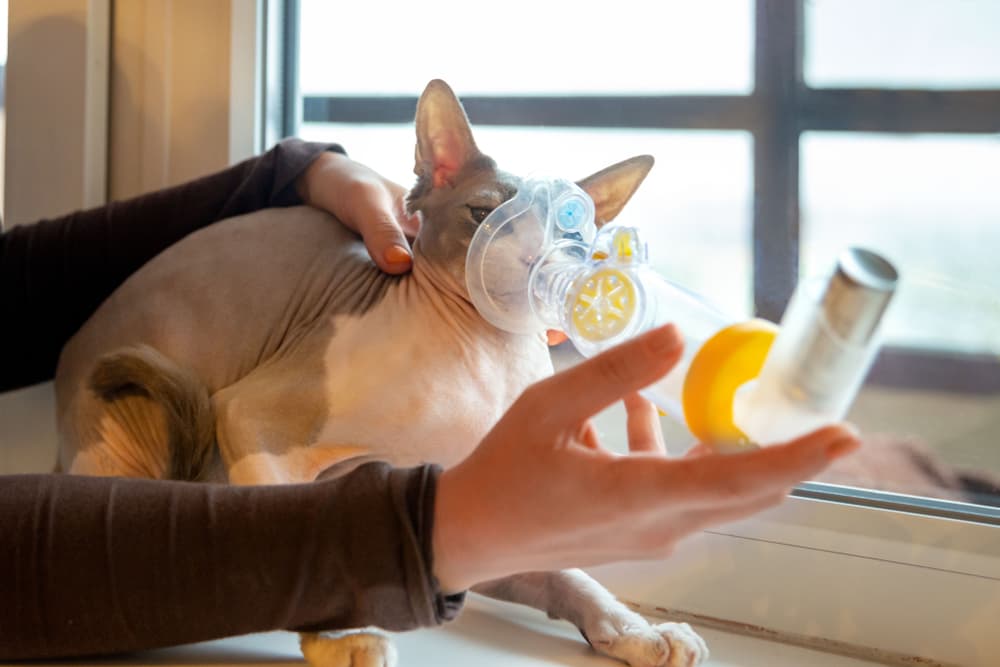
How you treat a coughing cat depends on the cause of the coughing, so get a diagnosis by a veterinarian first. In some cases, your vet may recommend diagnostic imaging to identify the exact cause of the cough. Whether your vet recommends laboratory and diagnostic services or a prescription medication, you can use CareCredit for any type of care your cat needs, at any provider in the CareCredit network.*

- Pay over time with flexible financing options*
- Use your card again and again for any type of care your pet needs
- Accepted at most veterinary hospitals**
Some of the more common treatments for coughing in cats include:
- Antibiotics for respiratory infections or pneumonia such as doxycycline or enrofloxacin.
- Steroids for chronic bronchitis, polyps or other inflammatory conditions such as prednisolone by mouth or a cat inhaler containing fluticasone.
- Antiparasitics for lungworms such as fenbendazole by mouth or imidacloprid/moxidectin applied to the skin.
Cats who have more serious conditions such as pleural effusion, trauma, or severe pneumonia may need to stay in the veterinary hospital and get treated with oxygen, medications, and special procedures like the removal of fluid from the chest. Veterinarians do this using a needle—a minor procedure called thoracocentesis.
If a foreign body or polyp is present, your veterinarian may recommend anesthetizing your cat at the hospital and examining their mouth, throat, and nasal cavity while sleeping. If your vet finds a polyp, they may be able to remove it. Flushing the nasal cavity may help if a foreign body sticks near the back of the throat, or if there is a large amount of mucus production.
Medicine for a Coughing Cat
Dextromethorphan and guaifenesin are two medications that help manage coughing in cats. You can find these medications over the counter and in human medications. Vets rarely recommend these for cats as they are largely ineffective and do not treat the cause of the cough, which can worsen with time.
If your cat is coughing, cough medicine is not recommended. They need to be seen by a veterinarian.
When to Worry About a Coughing Cat
If you hear your cat coughing one day and you had not heard them coughing before, monitor them closely. A cat who is coughing, even occasionally, for two weeks or more likely has a chronic medical issue that needs attention, even if they are not experiencing other symptoms of illness. Realizing your cat is coughing and bringing them to the veterinarian early is the best way to keep your cat healthy.
If your cat coughs a lot one day or appears in distress, get them to the veterinarian right away. Specific symptoms that indicate an emergency include:
- Limited to no appetite
- Decreased or no activity
- Hiding or other change in behavior
- Breath rate is more than once per second (over 60 breaths per minute)
- Breathing appears exaggerated, such as the chest and/or belly are moving in and out quickly or dramatically or your cat is open mouth panting/breathing.
*Subject to credit approval. See carecredit.com for details.
**Internal estimates based on publicly available market sizing information, as of Feb 2023
This information is shared solely for your convenience. Neither Synchrony nor any of its affiliates, including CareCredit, make any representations or warranties regarding the products described, and no endorsement is implied. You are urged to consult with your individual veterinarian with respect to any professional advice presented.
